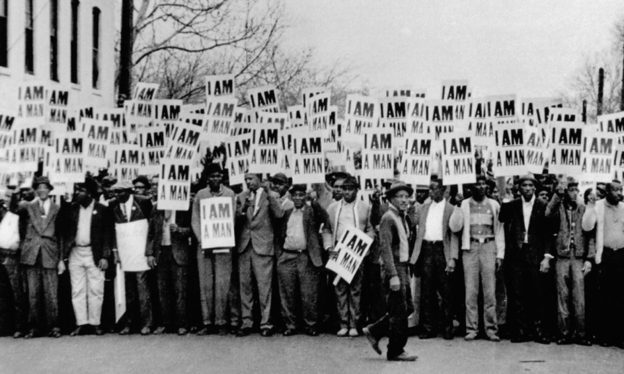Back to all articles
MLK Day

“All men are caught in an inescapable network of mutuality, tied in a single garment of destiny. Whatever affects one directly, affects all indirectly. I can never be what I ought to be until you are what you ought to be, and you can never be what you ought to be until I am what I ought to be.” ~ Martin Luther King, Jr.
When Dr. Martin Luther King Jr. was assassinated, he was fighting for the rights of sanitation workers in Memphis. Today, we reflect on the significance of this struggle–and how far we’ve come and how far we have to go to reach economic justice.
During a heavy rainstorm in Memphis on February 1, 1968, two Black garbage collectors were killed by a malfunctioning garbage truck. On the same day, 22 Black sewer workers were sent home without pay while their white supervisors received a full day’s wage. These events, in combination with a long history of poor wages and unsafe working conditions, galvanized over one thousand sanitation workers to organize a strike and protests.
In the midst of his work on the Poor People’s campaign, Dr. Martin Luther King Jr. traveled to Memphis to support the workers. “The issue is injustice,” he said. “The issue is the refusal of Memphis to be fair and honest in its dealings with its public servants, who happen to be sanitation workers.” A few weeks later, King gave his “I have been to the Mountaintop” speech. The next day, he was assassinated.
The demands of those strikers in 1968 were eventually met. We still have much to learn from the determination, community solidarity, and collective resistance that was demonstrated during that time. As King told the workers in Memphis, “Our society must come to respect the sanitation worker. He is as significant as the physician, for if he doesn’t do his job, disease is rampant.”
Today, many sanitation workers across the country still face unacceptable conditions. Waste removal remains one of the most dangerous jobs in the country, especially in the midst of a pandemic. This May, sanitation workers in New Orleans went on strike for higher wages, hazard pay, and personal protective equipment.
The fight for justice for sanitation workers is far from over. At the same time, access to these services is highly inequitable. Disparities in access to basic services, such as a working toilet, perpetuate cycles of poverty and marginalization. As Catherine Coleman Flowers describes in her new book, Waste: One Woman’s Fight Against America’s Dirty Secret, many Black and rural poor communities lack access to affordable wastewater systems, further entrenching structural poverty.
Today we honor and uplift all those “who put their freedom on the line in pursuit of solutions,” as Flowers writes. The right to ecological sanitation is interconnected with rights to sanitation services that are both dignified and available to all.

